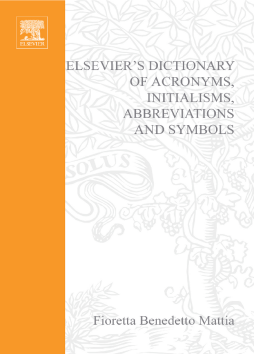
BOOK
Elsevier's Dictionary of Acronyms, Initialisms, Abbreviations and Symbols
(2003)
Additional Information
Book Details
Abstract
The dictionary contains an alphabetical listing of approximately 30,000 (thirty thousand) acronyms, initialisms, abbreviations and symbols covering approximately 2,000 fields and subfields ranging from Pelagic Ecology to Anthrax Disease, Artificial Organs to Alternative Cancer Therapies, Age-related Disorders to Auditory Brainstem Implants, Educational Web Sites to Biodefense, Biomedical Gerontology to Brain Development, Cochlear Implants to Cellular Phones, Constructed Viruses to Copper Metabolism, Drug Discovery Programs to Drug-resistant Strains, Eugenics to Epigenetics, Epilepsy Drugs to Fertility Research, Genetically Modified Foods/Crops to Futuristic Cars, Genetic Therapies to Glycobiology, Herbicide-tolerant Crops to Heritable Disorders, Human Chronobiology to Human gene Therapies, Immunization Programs to Lunar Research, Liver Transplantation to Microchip Technology, Mitochondrial Aging to Molecular Gerontology, Neurodegenerative Diseases to Neuropsychology of Aging, Neurosurgery to Next Generation Programs, Obesity Research to Prion Diseases, Quantum Cryptography to Reemerging Diseases, Retinal Degeneration to Rice Genome Research, Social Anthropology to Software Development, Synchrotron Research to Vaccine Developments, Remote Ultrasound Diagnostics to Water Protection, Entomology to Chemical Terrorism and hundreds of others, as well as abbreviations/acronyms/initialisms relating to European Community and U.S., Japanese and International Programs/Projects/Initiatives from year 2000 up to 2010 as well as World Bank Programs.
